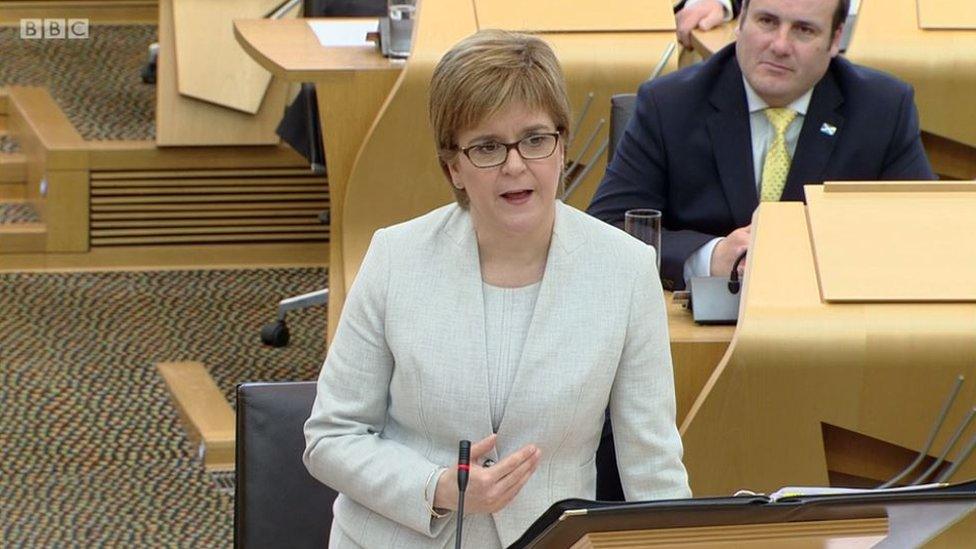MSPs call for clarity over named persons system
- Published

The named person will generally be a teacher or health visitor, depending on the child's age
MSPs have called for more clarity on proposed changes to the Scottish government's named person scheme after criticism from lawyers and nurses.
Legislation is being considered to get the system up and running by addressing concerns from the Supreme Court over information-sharing provisions.
Holyrood's education committee heard evidence that named persons were likely to have their lawyers "on speed dial".
They have now written to ministers seeking reassurance over their plans.
Meanwhile, First Minister Nicola Sturgeon has defended the system as targeting "the greater protection of vulnerable children, which is surely one of the most important responsibilities of us all".
However, she faced called from opponents to go back to the drawing board and "start again" with the plans.
The scheme was first signed off by MSPs as part of the Children and Young People (Scotland) Act 2014, but the plan to appoint a named person responsible for ensuring the welfare of every child were quickly tied up in legal challenges.
Judges at the Supreme Court ruled against the scheme in 2016, saying that while its aim was "legitimate and benign", information-sharing provisions were incompatible with the rights to privacy and a family life under the European Convention on Human Rights.
Ministers thus brought forward the Children and Young People (Information Sharing) (Scotland) Bill in a bid to make the changes necessary to satisfy the court and bring the scheme into operation.

One of the main changes proposed is that a duty to share information which could support, promote or safeguard the wellbeing of a child would become a duty to consider whether to share that information.
MSPs on the education committee heard evidence from the Royal College of Nursing that there was "confusion and nervousness" among staff about the plans, and fears that the change could turn decisions into a "tick box exercise".
They said that "members could find themselves exposed to professional risk that wasn't there previously".
'Damned if you do'
This followed earlier concerns from the Faculty of Advocates, who said "some of the criticisms of the Supreme Court will continue to apply if the bill as drafted is passed".
They said that having named persons consider whether to share information would have to carry out a "proportionality exercise" - an "exceptionally difficult requirement" for non-lawyers which "risks making their job considerable more difficult".
In the latest evidence session, Janys Scott QC from the faculty said professionals could be put in a "damned if you do, damned if you don't situation" which could potentially leave the legislation open to further legal challenge.
And solicitor Kenny Meechan from the Law Society of Scotland said he could "envisage an awful lot of people who are given named person responsibilities having their legal department on speed dial".

Nicola Sturgeon said the government would give full consideration to views raised during the legislative process
Education committee convener James Dornan has written a letter, external to Education Secretary John Swinney putting these concerns to him, and asking what additional work teachers and health visitors would have to undertake.
He wrote: "The requirements of the bill appear potentially to add to the pressures on the workforce."
The SNP MSP also asked the education secretary - who had earlier told another committee that he did not agree with some criticism of the legislation - to provide a revised version of the code of practice for named persons.
He said a revised version of the code was needed "at the earliest opportunity" to allow the committee to "more effectively scrutinise" the legislation.
'Simply won't work'
The letter came as Ms Sturgeon defended the policy at her weekly question session, after facing criticism from Scottish Conservative leader Ruth Davidson.
Ms Davidson said even supporters of the named person scheme thought the legislation was "deeply flawed".
She said: "It's been clear to these benches for years that the named person scheme as designed simply won't work but we have a Scottish government that is simply ploughing ahead with it.
"I ask the First Minister, in all good faith, can we not just start again with a blank sheet of paper? Everyone in the chamber wants to protect vulnerable children, but we need to do it within the law."
Ms Sturgeon replied: "I'm glad eventually, after all of her questions, Ruth Davidson managed to mention vulnerable children because actually they are at the centre of this."
The first minister said there was a "difference of opinion" between her party and the Conservatives, but said all proposals for changes during the legislative process would be carefully considered.
She said: "The Supreme Court did not uphold the view of the Scottish Conservatives that the named person scheme in principle was illegal. What it did was point to what it saw as problems and flaws with the information sharing provisions. This bill is about rectifying those flaws.
"We're at the start of a legislative process in which stakeholders make their views known and we consider them. That is the process that we should engage in.
"We will also go forward with the central purpose firmly in mind: that this is about the greater protection of vulnerable children. That is the most important part of the whole debate."
- Published17 August 2017

- Published26 February 2017
